
Men and aging: Your guide to maintaining health and wellness
Though certain traits (like your ideal cocktail or hobby) will vary across individual men as they age, there are some changes that most men will experience as they age.
If you're curious about what aging holds for you or the men in your life, read on for what to expect for men aging and their most common health concerns.
Table of Contents:
- What to Expect as You Age
- Top 10 Health Concerns for Aging Men
- Men's Tips to Care for Your Health as You Age
- Additional Resources for Older Men
What to Expect as You Age
Though not all signs and symptoms of aging, or their onset, are universal, there are some aspects that most men will experience. Read on to learn what you can expect as you age, broken into categories between the ages of 45 to 65 and 65 and older.
Ages 45 to 65
Generally considered to be "middle age," at ages 45 to 65 many signs and symptoms of aging will have appeared for men (along with a few more gray hairs). With proper preventative care and healthy habits, you can continue to enjoy an active, healthy lifestyle. Here are some of the most common health topics for men to consider in this age bracket.
Bladder and Prostate Health
The bladder is one of the organs that may lose elasticity as you age, increasing the need to urinate more often. The prostate is also more likely to become inflamed in your older years, which could cause incontinence (loss of bladder control) or difficulty emptying.
If you find yourself going to the bathroom more frequently or having more accidents between bathroom breaks, talk to your doctor about what your next steps may look like, such as utilizing adult incontinence resources. It is also recommended that men within this age group discuss prostate cancer screening with their health care provider in order to make an informed decision about whether to be screened for prostate cancer.
Cardiovascular Wellness
One of the more common cardiovascular changes that occur as you age is that your arteries and blood vessels stiffen, causing the heart to work harder to pump blood. Generally, your resting heart rate will stay the same as it did at a younger age, but it will be more difficult to increase your heart rate during activity or exercise.
To keep your heart healthy and care for your cardiovascular wellness, the CDC recommends spending at least two days a week doing muscle-strengthening activities and at least 150 minutes a week of moderate physical activity like brisk walking.
Colorectal Care
The United States Preventive Services Task Force (USPSTF) recommends colorectal cancer screening in adults ages 45-75 at average risk of colorectal cancer. The cadence of screening depends on the type of screening test. It is recommended that stool-based tests, like the Fecal Immunochemical Test (FIT), are done annually. Men, and women, can do this with an at-home colon cancer screening test.
Sexual Health
As you age, your sexual health ages as well. In general, for older men, libido may decrease, and you may be unable to perform multiple times in an evening. The sperm count in each ejaculation will generally decrease at this age as well, though the amount of fluid remains the same.
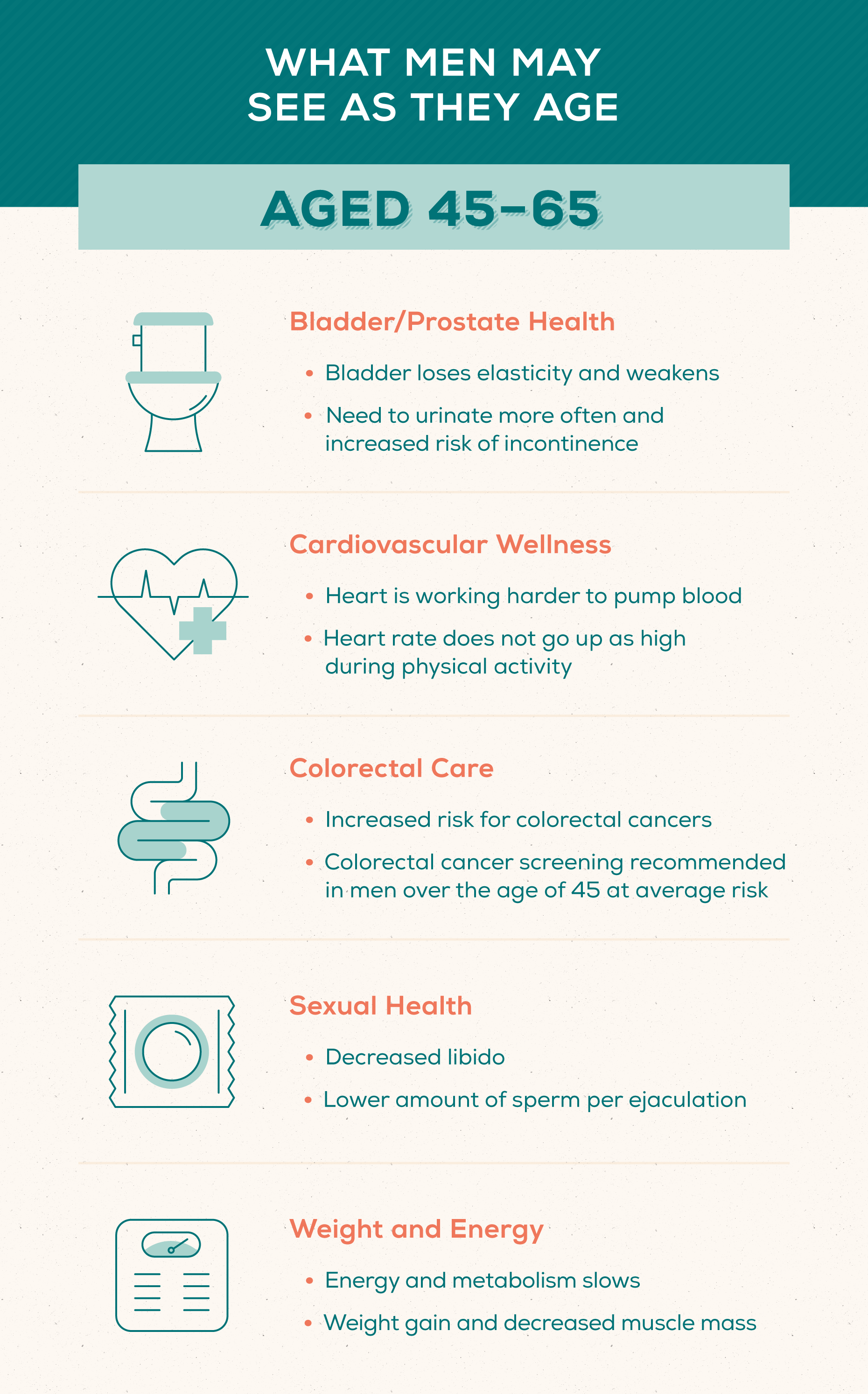
Ages 65+
You're often classified as a senior once you reach the age of 65. Many aspects of your body and health change as you age, with some significant changes to the five areas of health below.
Bladder and Urinary Tract Health
Bladder muscles continue to weaken and lose elasticity, resulting in an increased need to urinate frequently. An enlarged prostate can also cause the urethra to become blocked, which can cause urination problems or even kidney infections.
Aging also increases the likelihood of contracting urinary tract infections (UTI).
Cardiovascular Wellness
The heart is another organ that changes with age, and men over the age of 65 are more likely than their younger counterparts to have cardiovascular disease and:
- Heart attack
- Stroke
- High blood pressure (Hypertension)
- Heart failure
- Atrial fibrillation
Heart disease remains the number one cause of death for men in the United States, emphasizing the importance of caring for your cardiovascular health as you age. To remain physically active and in shape, the CDC advises men over 65 should aim for two days a week of activities that strengthen muscles; 150 minutes a week of moderate-intensity activity, like brisk walks; and activities that improve balance, like yoga, pilates, and balancing activities.
Colorectal Care
The United States Preventive Services Task Force (USPSTF) recommends colorectal cancer screening in adults up to the age of 75 at average risk of colorectal cancer. Screening in individuals over the age of 75 is not usually recommended if they’ve had previous negative screening tests, particularly colonoscopy. However, if they have not previously had a screening, they should receive one if they are 85 years of age or younger.
Sexual Health
Erectile dysfunction (ED) may be a concern for men in this age group, though it's normal for men to get fewer erections as they age than they did as younger men. ED is most commonly caused by physical changes in older men.
Libido may continue to decrease, with overall slower and less intense sexual responses. Aging men are also often unable to have repeated ejaculations in a short period of time. If you find yourself struggling with any of these questions, talk to your healthcare provider.
Weight & Energy
Due to a decrease in the male hormone testosterone, many men will begin losing weight and muscle mass around age 60. If you are experiencing symptoms characteristic of low testosterone levels, such as increased body fat, loss of muscle mass, and fatigue, consider a mail-in test that measures total testosterone to see what your hormone levels are.
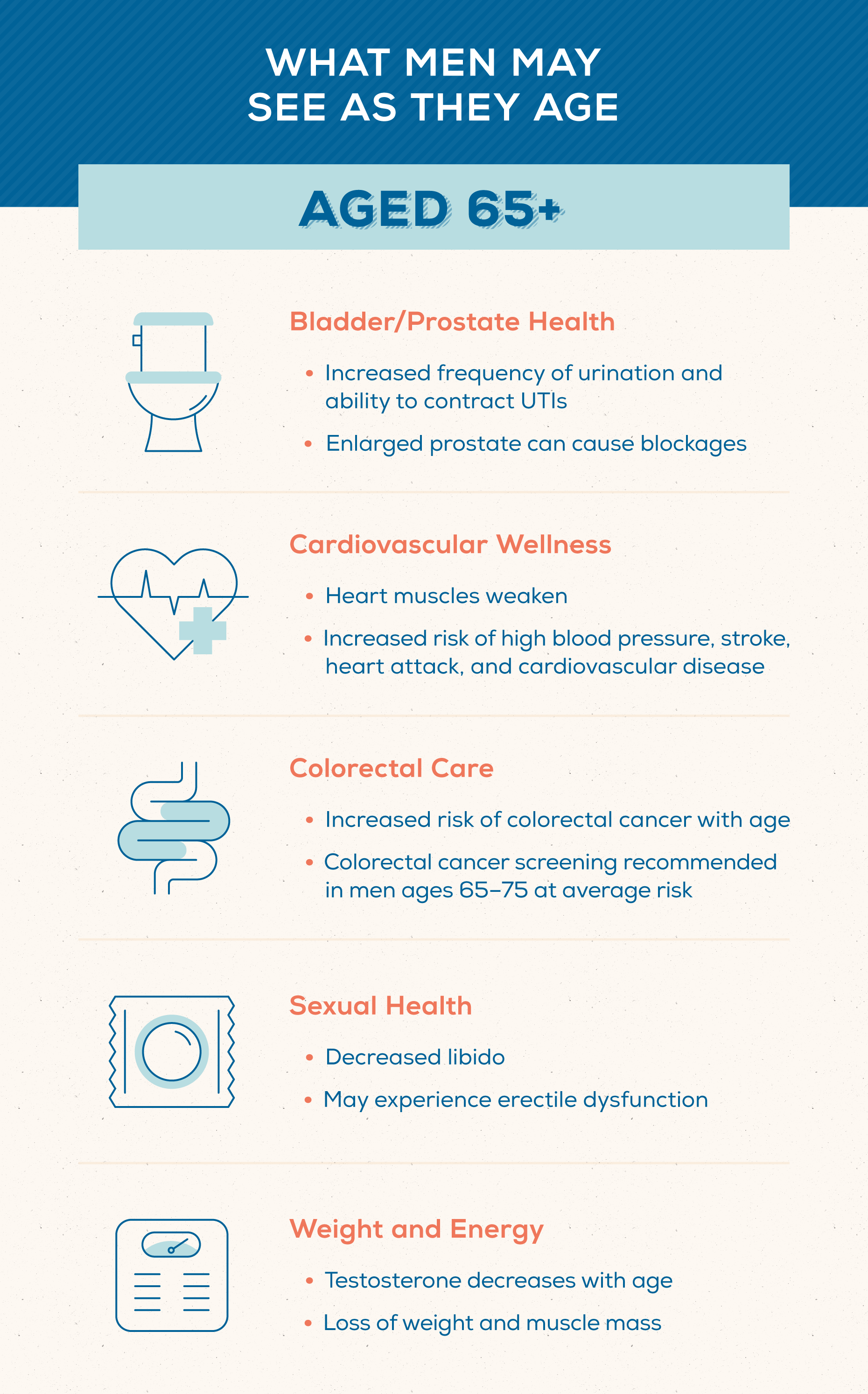
10 Health Concerns for Aging Men
Seniors are often categorized as those aged 65 and older. Below are some of the most common health concerns for men aged 65 and up, though note that this is not an exhaustive list of conditions nor do they only affect men ages 65 and older.
1. Balance Issues
Falls are among the leading causes of injury for older adults, causing hip fractures, head trauma, and even death. Bone conditions like osteoporosis, which impact approximately two million American men, can make falls or balance issues worse, as up to one in four American men over the age of 50 will break a bone due to osteoporosis, although this usually happens at a later age than in women.
Aging causes muscles to lose strength and bones to shrink, which leads to an increased risk for falling and breaking or fracturing a bone. This risk can further be exacerbated by osteoporosis, a condition where your bones become less dense and are more likely to break.
To prevent falls from affecting your life, it is recommended to continue engaging in regular physical activity and to make practical home modifications to suit your lifestyle.
2. Bladder Problems and Constipation
As observed previously, constipation and other bladder issues like incontinence are all common conditions that older adults, especially men, experience. These conditions occur for a variety of reasons, including bladder muscles weakening and losing the ability to hold regular bowel movements.
However, sometimes other factors play into having conditions like these as you age, including chronic medical conditions or not eating a well-balanced diet. Bladder issues are common in men aging, it is recommended to talk to your healthcare provider about management strategies or possible treatments that are specific to your needs.
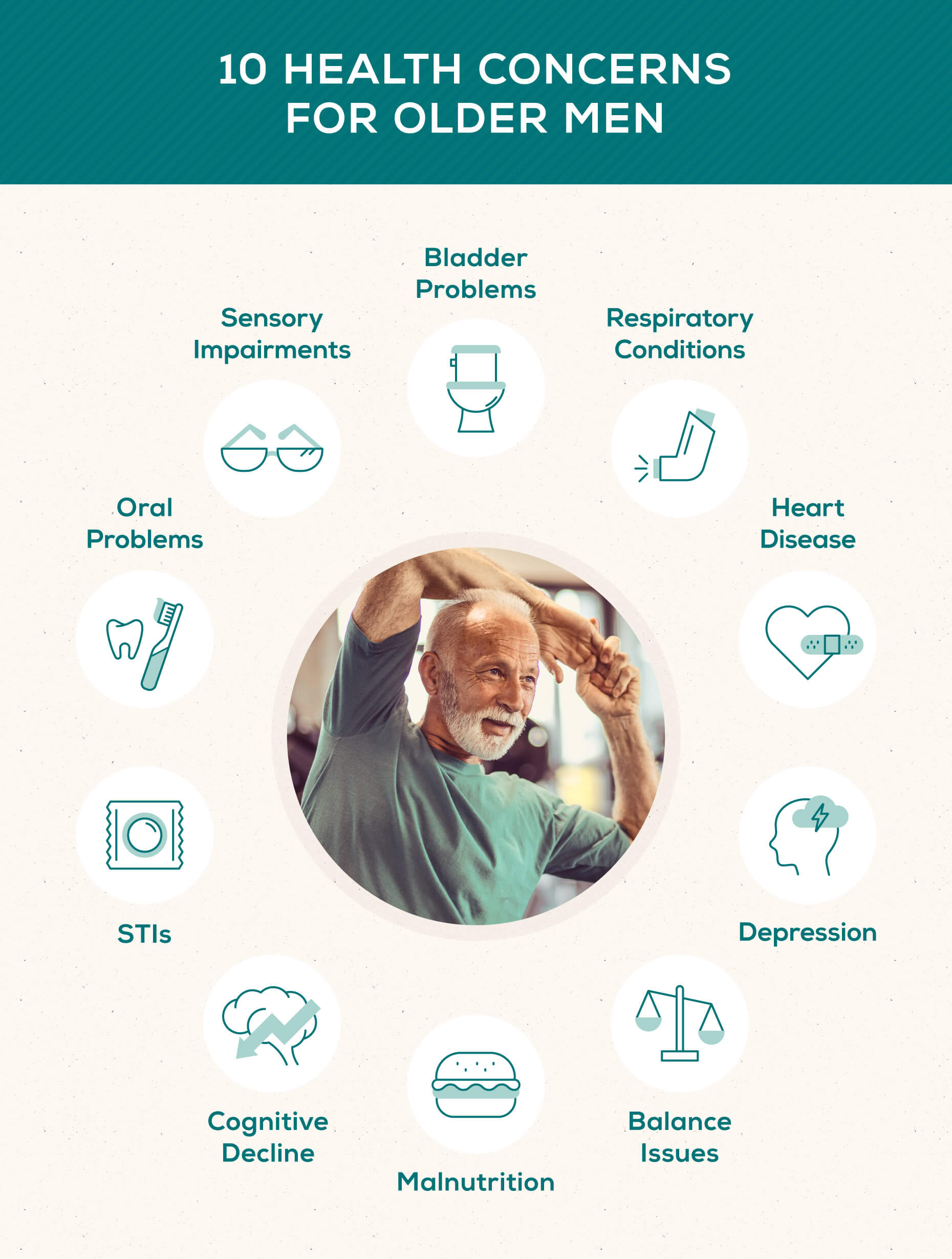
3. Cognitive Decline
Cognitive health involves a person's ability to learn, remember, and think. The loss of these basic functions is called dementia. Of those at least 65 years of age, the CDC estimates 5 million U.S. adults were living with dementia in 2014, with this number expected to continue growing in the coming years.
The most common kind of dementia in the U.S. is Alzheimer's Disease, which accounts for 60 to 80 percent of all U.S. cases of dementia. The National Institute of Health found that men are more at risk than women to develop mild cognitive impairment (MCI), often a precursor to Alzheimer's Disease. This underlines the importance for men to care for themselves and see a licensed professional if their cognitive conditions worsen or decline.
While there are no known cures for dementia and other cognitive conditions, a licensed healthcare provider can work with you to create a management plan that may include medications to help manage symptoms. If you start noticing symptoms of cognitive decline or if you have a family history of dementia, start the conversation with your doctor early.
4. Depression
Globally, 15% of adults 60 and older have a mental disorder of some kind, with depression affecting 7% of that population. This is often an underdiagnosed condition in older adults, particularly men, often due to the stigma surrounding mental health in older communities. This lack of support can cause undertreatment, which can, in turn, lead to serious side effects — like suicidal ideation.
Depression in older adults can be a side effect of chronic health conditions or medications, so it's important to talk to your healthcare provider to find the right treatment plan that can help mitigate depressive thoughts or episodes — such as talk therapy, medication, support groups, or a combination.
5. Heart Disease
Heart disease is the leading cause of death for most racial and ethnic groups in the United States, accounting for one out of every four male deaths. About one in 13 white men, one in 14 Black men, and one in 17 Hispanic men have coronary heart disease.
Conditions that lead to heart diseases such as high blood pressure or high cholesterol, should be managed properly through regular consultations with your healthcare provider, who may prescribe you medications to help you manage these conditions. Taking good care of your heart with regular exercise and heart-healthy foods is also an important part of preventing heart disease.
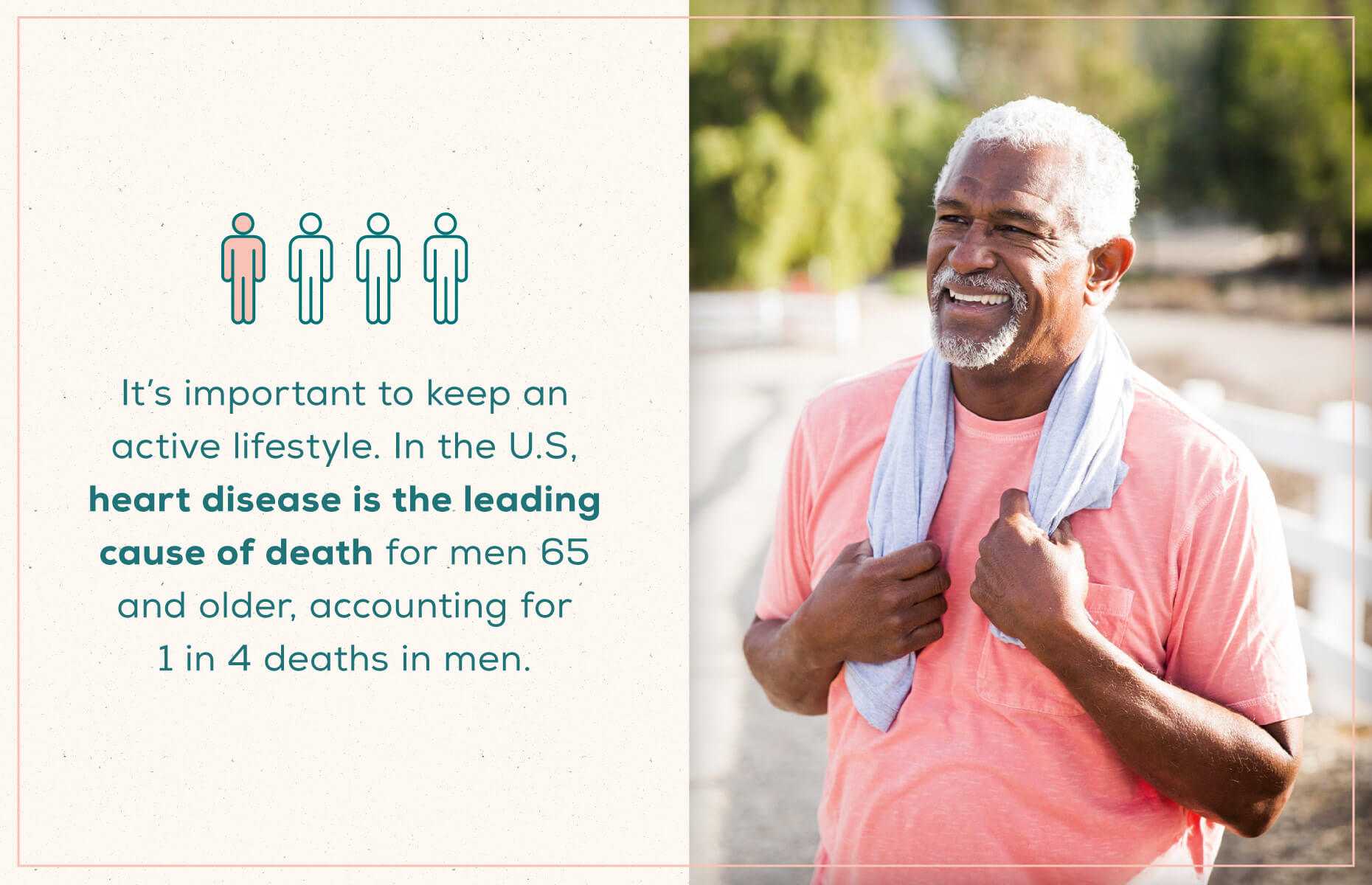
6. Malnutrition
Both men and women aged 65 and older are often at risk of being underdiagnosed when they are malnourished, which can often exacerbate or impact other health issues like muscle weaknesses, immune system complications, bone health, or cognitive decline.
Malnutrition is often a symptom of an underlying health issue, such as:
- Dementia causing seniors to forget to eat
- Depression causing seniors to not want to cook
- Dietary restrictions causing seniors to not have many healthy options
There are food services available to homebound seniors. The National Council on Aging (NCOA) recommends that across the board, seniors should decrease consumption of salts and saturated fats, and increase intake of fruits and vegetables, to ensure an adequate intake of nutrients and healthy foods.
7. Oral Health Issues
Oral health is an area that many male seniors overlook, but it is an important part of your health to care for throughout your life. The Academy of General Dentistry found that men are less likely to visit the dentist than women, emphasizing the need to care for oral health.
The Center for Disease Control and Prevention's Division of Oral Health found some striking statistics around the oral health of seniors, including that nearly one in five adults aged 65 or older have lost all of their teeth. Other oral conditions prevalent in seniors, particularly older men, include cavities, gum disease, oral cancer, dry mouth, and untreated tooth decay.
These conditions can be prevented or progression can be slowed with regular dental check-ups and maintaining recommended oral upkeep, such as brushing and flossing twice a day.
8. Respiratory Conditions
Like your other vital organs, your lungs change and may have a decrease in capacity as you grow older. Among these changes is the reduction in total air your lungs can hold, steady weakening of the diaphragm, thinning of rib bones, airway nerves becoming less sensitive, and an overall reduction in the capacity of the immune system.
Smoking can also cause respiratory conditions later in life, particularly emphysema — a subcategory of a larger group of lung diseases known as chronic obstructive pulmonary disease (COPD). More men than women have been diagnosed with this disease, affecting more than 11 million American adults. Emphysema is most common in men between the ages of 50 to 70.
To keep your lungs healthy and maintain strong lung function, experts at the American Lung Association recommend regular exercise, not smoking, watching your weight, getting appropriate immunizations, and seeing a healthcare provider regularly.
9. Sensory Impairments
Sensory impairment is classified as anything that affects any of the five senses: touch, taste, sight, sound, or smell. According to the CDC in 2019, for Americans aged 65 and older:
- 30.8 percent have difficulty hearing
- 22 percent have trouble seeing
The CDC found that men are slightly more likely than their female counterparts to have a hearing impairment (33.9% vs. 20.7%)
Untreated, conditions like hearing or vision loss pose a significant risk to safety and your quality of life. Luckily, there are many options to treat both of these issues, such as glasses or hearing aids. Consult your healthcare provider to discuss your options.
10. Sexually Transmitted Infections
In 2018, 51% of people in the U.S. with an HIV diagnosis were aged 50 or older. While new diagnoses occurring in this age group have declined, most diagnoses in people ages 50 and older were among men. While you may notice some changes during sex as you age, it’s always important to practice safe sex and protect yourself from STIs.
It’s also important to get tests for STIs if you’ve had multiple sexual partners, are a man who has sex with men, have HIV or have a partner with HIV.
Men's Tips to Care for Your Health as You Age
Now that you know what to expect as you age and the health risks older men may face, here are some tips that can help you age with grace and care for your health.
Get Recommended Regular Screenings and Checkups
Regular screenings, tests, and checkups with a licensed medical professional can ensure you are doing what you can to prioritize your health and let you know if there's anything you need to change or get ahead of a potential health issue.
Recommended checkups and screenings for men include:
- Blood pressure screening: The USPSTF recommends adults ages 18 years and older without known hypertension (high blood pressure) should be screened with an office blood pressure measurement every 3-5 years. Adults ages 40 years or older and adults at increased risk for hypertension (such as Black persons, persons with high-normal blood pressure, or persons who are overweight or obese) should get their blood check annually.
- Cholesterol screening: The American Heart Association and American College of Cardiology recommend healthy adults ages 20 and older have their cholesterol and lipids checked every 4-6 years. Consider an at-home cholesterol test to track your levels between screenings.
- Colorectal cancer screening: The USPSTF recommends colorectal cancer screening in adults ages 45-75 at average risk of colorectal cancer. Consider an at-home FIT test to determine your risk.
- Diabetes screening: The American Diabetes Association recommends men over 44 should be screened for diabetes every three years. HbA1c tests may help with this.
- Eye exam: The American Academy of Ophthalmology recommends a comprehensive eye examination every 1 to 2 years for all adults 65 years or older who do not have risk factors or more frequently if risk factors are present.
- Infectious disease screening: The USPSTF recommends screening for hepatitis C at least once in adults ages 18 to 79. Other STI screenings such as HIV and syphilis in individuals who are at an increased risk of infection, such as men who have sex with men, are also recommended. Consider screening for STIs with an at-home lab test, such as our syphilis test, for added convenience.
- Lung cancer screening: The USPSTF recommends annual lung cancer screenings with low-dose computed tomography (LDCT) for adults ages 50 to 80 with a 20 pack-year smoking history and who currently smoke or have quit smoking in the past 15 years.
- Oral health screening: It is recommended all adults should go to the dentist once or twice per year for an exam and regular cleaning.
- Osteoporosis screening: The National Osteoporosis Foundation recommends bone mineral density testing in all men ages 70 and older and men ages 50 to 69 based on their risk factor profile, including if they had a fracture as an adult.
- Prostate cancer screening: The American Cancer Society recommends that men ages 50 and older at average risk for prostate cancer discuss prostate cancer screening with their health care provider in order to make an informed decision about whether to be screened for prostate cancer. Recommendations may vary for men at a higher risk of prostate cancer due to their race, family, or personal medical history.
- Skin exam: It is recommended to talk to your healthcare provider about whether you may be at an increased risk of skin cancer and to report any unusual moles or changes in your skin.
Eat a Healthy Diet
Eating healthily can make a positive impact on overall health and energy levels for older men. What you eat impacts your energy, brain, mood, and your body, so a healthy diet full of lean proteins, whole grains, fish, fruits, nuts, and other nutritious foods from all food groups is recommended for aging men over 50.
If you have specific dietary questions, it is recommended to speak to your healthcare provider or a registered dietitian.
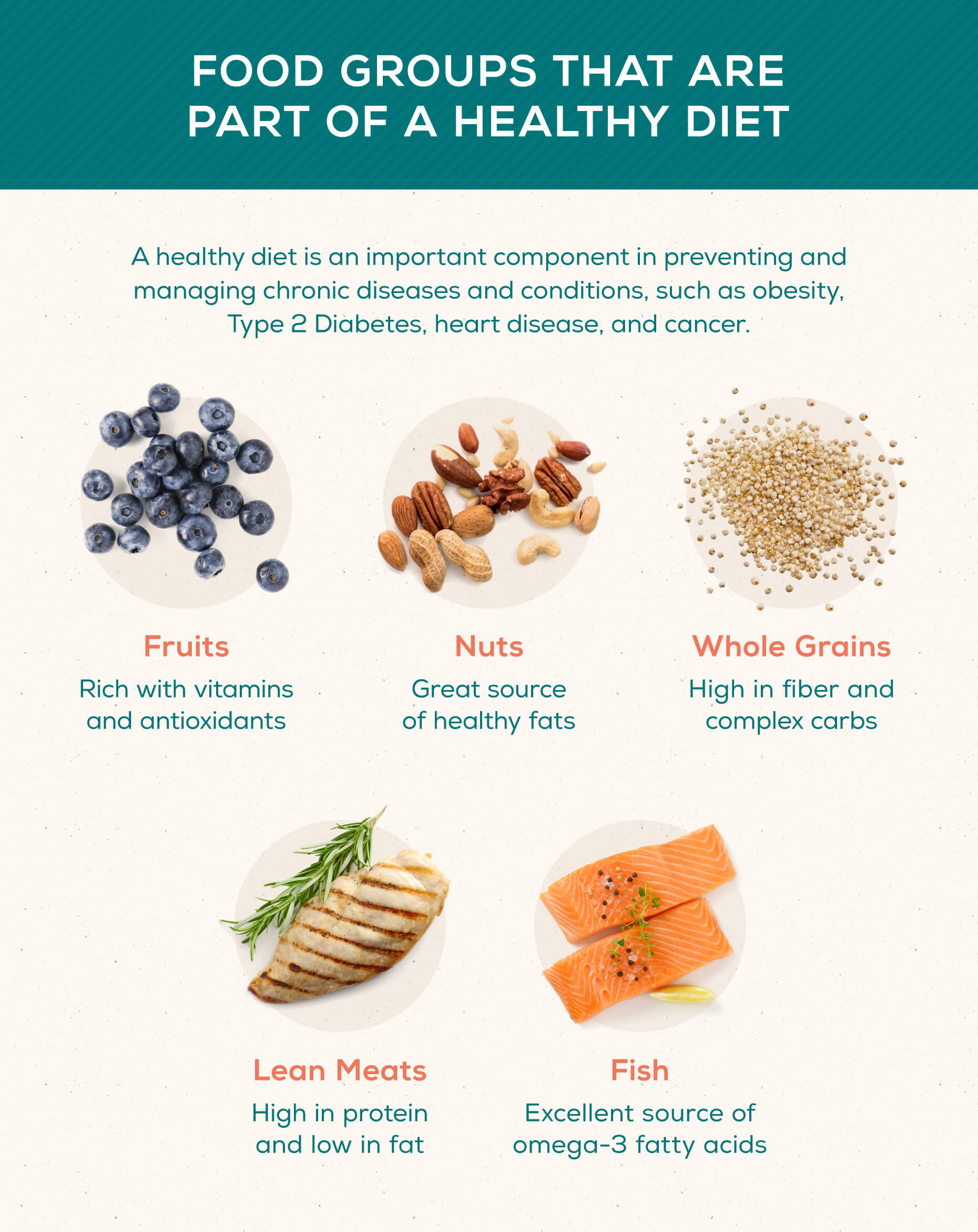
Know Your Family History + Talk To Your Doctor
Though some health conditions can come up out of nowhere, it is useful for men to do a deep dive into their family history. Discussing your family history with your healthcare provider can help you to better understand your risk for certain conditions, such as heart attack or some cancers and may help determine which screenings or tests you should have and at what age.
Additional Resources for Older Men
There's a lot of information out there about how to care for yourself as you age, along with the many health conditions older men may face. For more tips on caring for your health as an older man, take a look at these additional resources to help you make your health and wellness a priority.
- American Urology Association: Urology Care Resources
- Centers for Disease Control and Prevention: Promoting Health for Older Adults
- CDC: Men & Heart Disease
- National Institue on Aging: Heart Health and Aging
- CDC: Prostate Cancer
- American Cancer Society: Cancer Facts for Men
- National Institute of Mental Health: Men and Depression
- National Institute on Aging: Brain Health
- HIV.gov: Aging with HIV
For more specific questions or concerns about your health as you age, it is recommended to speak to your healthcare provider.
Caring for yourself is a lifelong practice but becomes even more important as you mature into an older adult. Through routine care, testing, and prioritization of your changing needs, you can age with grace.
Sources: American Lung Association | University of Texas MD Anderson Cancer Center | Cleveland Clinic | Mayo Clinic